Heat Treatment – An Overview
Published - 21st Jul 2020

Heat treatment is used to improve the mechanical and physical properties of aluminium castings, primarily to increase the tensile strength and reduce the ductility (stretch) of the metal
In this blog, we look first at the science behind heat treatment before turning to the specific processes employed at Haworth Castings.
How heat treatment works
Metallic castings are made up of a microstructure of tiny crystals called ‘grains’. The arrangement of these grains is one of the key factors in determining the mechanical properties of the metal. Heat treatment, which involves putting the casting through one or more thermal cycles, allows you to manipulate the grains and alter these properties.
Heat treatment is carried out in a highly controlled manner in specialised furnaces to ensure that the casting retains its original shape without cracking. The temperature is kept within very strict parameters to ensure that the casting complies with the required specification.
Our heat treatment processes
At Haworth Castings, we use various heat treatment conditions to produce the different degrees of hardness required for our castings. The suffixes used below (TF, TB7 and TE) are BSI heat treatment standards for aluminium alloys. Once treated, the hardness of the casting is measured on the Brinell scale (in HB units) – which is a nationally recognised standard.
Water quenching
TF (fully heat treated) – the casting is generally heated to 515-535°C in a furnace for 4 to 12 hours before it is quenched in water. The water must be warm rather than cold otherwise the sudden variation in temperature could cause the casting to crack due to the thermal shock. The casting is then heated in a secondary oven at 150-160°C for a further 4 to 16 hours. The hardness of the casting will be between 90 and 110 HB on the Brinell scale – almost double the hardness of the original casting.
TB7 (solution treated and stabilised) – this process is similar to TF but the casting is heated to a higher temperature at the secondary stage, 240-270°C, for 2 to 4 hours before being quenched. The hardness will be between 75 and 85 HB, giving a more malleable material than the TF treatment.
Stress-relieving
TE (age hardening) – the casting is heated to a temperature of 150-170°C for 4 to 12 hours. This process is used for intricate castings with fine features. This heat treatment process is used to speed up the natural age hardening of the casting. No quenching is involved as this could take the casting outside the dimensional tolerances.
Polymer quenching
Using this process, the casting is quenched at a much slower rate using a polymer rather than water. This puts the casting under less stress. Polymer quenching is particularly suitable for intricate castings that do not require such a high degree of hardness.
Crack detection
Once the heat treatment has been completed, the castings can be put through crack detection analysis to check for any defects.
At Haworth Castings, we offer the full range of heat treatment services to meet exacting customer requirements. Contact us today at: sales@haworthcastings.co.uk or call +44 (0)1794 512685 to find out more.





